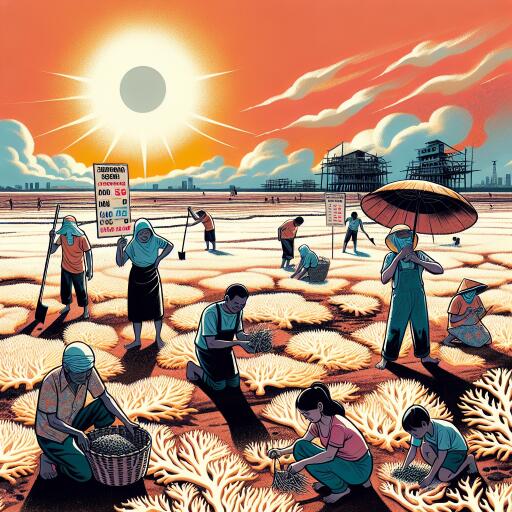
Heatwaves Cause Hardships for Seaweed Farmers in Southern Philippines
In the remote archipelago of Tawi-Tawi, located in the Bangsamoro Region of the southern Philippines, the art of seaweed cultivation runs deep through the veins of local communities. For generations, families like that of a local farmer named Siyulay have depended on the intricate practice of growing seaweed, not just for income but as an integral part of their cultural heritage and environmental stewardship.
Seaweed farming in Tawi-Tawi is not merely an occupation; it’s a testament to the resilience and adaptability of the local communities. It provides critical economic stability for many small-scale farmers who cultivate the sea as their ancestors did. However, the tranquility of this age-old vocation is increasingly threatened by the relentless tide of climate change, manifesting primarily through intensified heatwaves.
Siyulay, who has spent his entire life tending to his underwater gardens, has been observing troubling changes over the years. An increase in the frequency and severity of heatwaves has begun to cast a long shadow over their traditional way of life. These extreme temperature fluctuations are not only detrimental to the health of the seaweed but also disrupt the delicate ecological balance necessary for its growth. For Siyulay and many others, the ramifications of these climatic shifts are deeply personal. The seaweed they harvest is more than just a commodity; it’s a living indicator of the health of their marine environment.
The recent patterns of unusually high temperatures have led to a noticeable decline in seaweed production, compounding the socio-economic challenges faced by these communities. The ramifications of reduced yields are multifaceted, affecting not only the income levels of the farmers but also the overall biodiversity of the region. As seaweed serves as a vital component of the marine ecosystem, its diminishing presence signals a broader environmental distress that could have long-term impacts on marine biodiversity.
This scenario in Tawi-Tawi is a microcosm of a larger issue facing our planet. The experiences of Siyulay and his fellow seaweed farmers underscore the urgent need for comprehensive action against climate change. It highlights how livelihoods that are deeply intertwined with the natural environment are especially vulnerable to the whims of a changing climate. Moreover, it is a stark reminder that the impacts of such environmental shifts are not distributed equally, with marginalized communities often bearing the brunt of the harm.
As the world grapples with the monumental task of addressing climate change, the story of Tawi-Tawi’s seaweed farmers serves as a poignant example of why adaptation and resilience must be at the core of our strategies. Supporting these communities through technology, education, and sustainable practices could not only safeguard their way of life but also contribute to the broader fight against environmental degradation. The resilience of Tawi-Tawi’s seaweed farmers in the face of adversity is a powerful testament to the human spirit and a call to action for us all to take meaningful steps towards a more sustainable future.
As we move forward, it is crucial that global efforts to mitigate climate change include support for those who are on the frontlines, like the seaweed farmers of southern Philippines. Their livelihoods, culture, and the health of our planet’s marine ecosystems depend on it. Through collaborative efforts, innovation, and a sustained commitment to environmental stewardship, we can hope to address the challenges posed by climate change, ensuring a thriving planet for future generations.





Leave a Reply